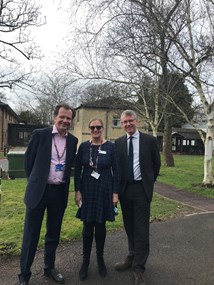The trust:
Oxford Health NHS Foundation Trust is a community-focused organisation that provides physical and mental health services and social care with the aim of improving the health and wellbeing of all our patients and their families.


The challenge:
Oxford Health faces the challenge of providing mental and physical health services across a large geographical area with a population of 9.5 million. It also represents a complex stakeholder landscape with an integrated care board (ICB) which straddles three counties and covers several different local authorities. In addition, the challenges of workforce recruitment and retention in an area with very high property values and costs of living with London nearby, means international recruitment has become a means of filling gaps, together with the use of agency medical and nursing staff. The mental health needs of children have increased significantly, and children and adolescent mental health services (CAMHS) is under enormous pressure with 5000 children awaiting assessment. It is felt research does not receive the attention it needs at a national level – this is very important to Oxford Health and its network of research partners. Capital availability is also a frustration – although the trust is building a new eight bedded Tier 4 unit for children.
Delivering:
The trust is using international recruitment, largely from the African and Asian sub-continent, to tackle the workforce challenge in nursing. The trust has 107 nurses from overseas who are all trained in physical health but undergo training locally and a full package of induction and social support. The trust has a real focus on research with a £36m award over the next five years with 11 themes. The Brain Health Clinic (BHC) is a central part of this. Led by Professor Clare Mackay it is examining the role of imaging in brain disorders and has a dedicated clinic in the grounds of the trust co-located with the university department of psychiatry. The trust has established a national research network which partners with several other trusts – they see this as a key strength and way to improve population health outcomes.

Julian says:
I was delighted to visit Oxford Health NHS Foundation Trust to meet with chief executive Nick Broughton and chair David Walker and several of their team. We met at Warneford Hospital in Headington Oxford, which dates back to 1826 and continues to play a role as a major hospital for the provision of mental health services. We began by discussing the major issues faced by the trust including workforce recruitment and retention where in particular the cost of housing in Oxford means this is challenging. Although the trust’s proactive approach to international recruitment and apprenticeships are helping. Primary care in Oxford is a concern with 10 practices closing in the last few years and with demand for CAMHS at an all-time high this is placing major pressures on the trust’s services. Oxford Health has a complex stakeholder network of local authority, ICB and provider collaborative partnerships across its 9.5 million population catchment and plays a pivotal role in all of these. We also discussed how the trust is responding to these issues and its ambitious vision for the redevelopment of the Warneford site to build a world class brain sciences campus, including a leading inpatient mental health unit alongside a research unit in partnership with Oxford University.
After this I spent time with chief nurse Marie Crofts, visiting one of the trust’s female acute inpatient wards led by Hannah the ward manager and overseen by Noki the matron. Both Noki and Hannah and their team demonstrated how they manage the considerable challenges they face. I was really impressed by the emphasis on activity, engagement and physical health in addition to the work of the psychiatry team, led by Olga, who emphasised the importance of teamwork and staff health and wellbeing.
Nick and Marie introduced me to Professor Clare Mackay professor of imaging neuroscience who leads the BHC part of the trust and university’s £36m Biomedical Research Centre (BRC). The research Clare and her team are doing to find ways of understanding brain health using a sophisticated range of imaging modalities is fascinating and emphasises the importance of research in mental health. Bill Wells, head of national institute for health and care research experimental medicine infrastructure at the trust, emphasised the importance of the network of research partner trusts across the country who participate in the work of the BRC.
I was also able to don a virtual reality (VR) headset and see how VR is helping children and young people with psychosis as part of the Phoenix research study led by Professor Daniel Freeman. This proved to be a tantalising glimpse into the potential and possibilities of this technology in tackling mental health challenges, particularly for young people at a time when the need has never been greater.
We concluded with a lunchtime discussion with Nick, David, medical director Karl Marlowe and Bill Wells about the challenges and opportunities faced by the trust and its partners, particularly in relation to research and innovation.
I left inspired and excited not only by the trusts' plans, but also the wider possibilities for the mental health sector, in terms of research and innovation based on the strong relationship between high quality service delivery and innovative research.
About the author

